The Best Anime of 2021
Christopher Farris, Steve Jones, Mercedez Clewis & The Best Moments
by ANN Editorial Team,

Christopher Farris
5. Tropical-Rouge! Precure
My focus on these end-of-year lists tends to primarily be on my own personal gut-feeling appreciations for the releases we got. The effects of what was 'important' to the sphere of anime culture are then a distant second-place consideration. But those aspects often converge anyway on account of taste, and that's definitely the case here, because the release of Tropical-Rouge! Precure was kind of a big deal. It wasn't the first English-streamed Precure, but it was the first to be officially simulcasted all the way from the beginning. And after 17 years of fits and starts trying to get this iconic franchise over here (never talk to me about Glitter Force ever again!) that's pretty dang refreshing. As an added bonus, the show itself was great too!
I'll admit that a lot of the appeal I see in Tropical-Rouge comes from parts that click for me specifically. Just to start you've got one of my new favorite seiyuu Ai Fairouz anchoring the cast as lead heroine Manatsu in a magnificently manic performance (That lady got to be a Precure and a JoJo this year! Living the dream!), with the rest of the cast being enjoyable spins on your expected marketable magical-girl metatypes. I love how aspiring author Minori acts reserved and minimally expressive, until she transforms and starts bouncing around like a goofy grinning goober as Cure Papaya. And that's before I even address the real star of the show: Laura the Terrible Mermaid, whose rapport with the cast and growth through her antics brought highlights even when Tropical-Rouge was going through its most basic monster-of-the-week motions.
Tropical-Rouge isn't the strongest serial Precure cartoon I've seen, but its structure still feels tight in the long-term. Character anxieties are established in early episodes that are clearly recalled and worked through as we close in on the end of the story. And there are some truly tremendous single episodes in its dense year-long run, like the full-length stone-cold stunner that is Episode 29, or the unchecked insanity of Episode 33. More than those standout examples though, it's the cool consistency of Tropical-Rouge that I appreciated most about it, and the reliability of its now-precedented streaming status. No matter what other stuff I was trying to keep on top of in my life or my watchlog, I always found myself making time for Precure every weekend.
4. Kageki Shoujo
It feels weird to say this about a show that was at least 50% composed of characters' traumas by volume, but dang did Kageki Shoujo make me miss high school theater. In fact, I already talked plenty about the series' effective handling of said traumas back when I called it the best of its season a few months ago, so perhaps praising the unholy acting talent on display is the smart way to lead this time. As an eternally-recovering drama nerd, Kageki Shoujo's depiction of the actual techniques these theater girls used was an appreciably-escalating procession of "A-ha!" moments. Like Sarasa raising her hands up in front of her face in her climactic audition in the last episode, so she could maintain eye contact with the audience? That's not just a smart choice that demonstrates her seasoned acting abilities, it makes for a good suggestion for any aspiring performers playing along at home!
Kageki Shoujo's propensity for strongly surprising storytelling was something I enjoyed because it continuously demonstrated that new turns, changes, or recoveries could always be made regardless of where the characters and situations in the show ended up. That's part of why its handling of trauma seemed so effective, really, because the characters ended up treating their trauma as mere hurdles to get past and develop into stronger people, rather than continuously being defined by them. How else could we have gone from Ai having one of the most harrowing, hard-to-watch backstories depicted in recent memory, to seeing her growth transform her into one of the funniest characters of the year? As with any celebrated performer, it's all about the range. After all that, my fondest hope is that Kageki Shoujo can manage an impressive turnaround for itself, and actually be allowed another season sometime soon. These girls deserve it.
3. Uma Musume Pretty Derby Season 2
The second season of a mobile-game tie-in on my annual Top 5 list? Truly, this contender is a real…entrant into a competition whom you didn't expect to win! But to anybody who watched Uma Musume's second season this year, I think they probably know why. The second run for the Pretty Derby took the strong sports-show fundamentals of the original and set them against an emotional rollercoaster so intense it could only have been based on real-world racing careers. That's one of my favorite things about Uma Musume: that it recognizes the inherent unpredictability of 'real' sports narratives and tells a story not just based on them, but analytical of their nature. Rice Shower's arc, for instance, interrogates how fans react to 'heel' or 'spoiler' competitors, and it's that much more effective knowing that plot was borne out of an actual horse's race record and the way he was regarded by fans at the time. (Also, how ironic is it that Rice Shower's whole story is based on her being unpopular, but was so effectual that she's wound up becoming one of the most popular characters from the show?)
I also just appreciate how Uma Musume 2's success story reinforces that wonderful anime experiences can come from any source. To dismiss even an odd little series like this out of hand would be to put the cart before the…thing you shouldn't prioritize the cart over! There's almost a sense of disbelief to it, like how is the anthropomorphized racing-horse girl cartoon one of the best female-focused sports anime out there? But improbable success stories are a key component of these kinds of competitive shows, I suppose, so much like Tokai Teio's repeated post-injury comebacks that I should've known about had I just checked Wikipedia, I probably shouldn't be surprised at this one finishing in the front of the pack.
2. ODDTAXI
As someone who was onboard from the moment it started, it's been fun to follow the ride ODDTAXI's been on. As much as I immediately enjoyed it, my initial reaction to the show really was "How the hell did they get this greenlit?". It just seemed utterly anathema to the subjective sensibilities of popular anime these days. As the series continued and picked up considerable steam as a deserved critical favorite, it still kept feeling like one of those shows that would end up with the same old unfortunate story, the universally-praised series that mainstream audiences completely ignored. But then, something funny happened. ODDTAXI started to blow up. I saw more folks checking it out after all the praise it had gotten when it aired. Crunchyroll saw fit to dub it so it could reach an even broader audience. Its provisional Blu-ray pre-orders went over twenty times the number they had requested just to produce the thing! It all meant that ODDTAXI could no longer be considered for the odd honor of being 'The Best Show Nobody Watched' (that title for this year now officially belonging to Back Arrow).
And if you're one of those people who's since checked out ODDTAXI, you definitely know why. It feels like there's been an uptick semi-recently in shows of the 'surprisingly human story starring animals' variety (furries in anime stay winning), but ODDTAXI's treatment of that material turns out to be even more fundamentally profound than you might expect from the start. It's a story that digs deeply into the questions of what a person does that makes them considered 'good' or 'bad', and the nuances that can come with trying to prescribe those roles for others and ourselves. Trying to see past the furry visages of characters like our leading walrus-man Odokawa and figure out what really makes them tick is as driving a dramatic device for us as viewers as attempting to suss out the interconnected mystery story this zoo of a cast is involved in. And ODDTAXI welcomes us into gradually understanding why people here are the way they are, each one simply trying to make the most of whatever hand they've been dealt in life. And like an odd little anime that could go on to become a sleeper hit, sometimes that seemingly-innocuous hand can turn out to be a winner.
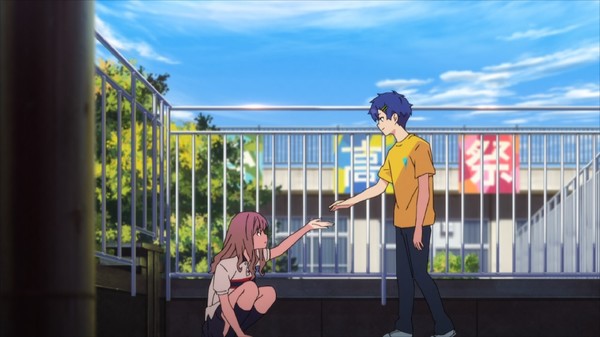
1. SSSS.Dynazenon
Looking over this laboriously-compiled list of the anime I loved the most this year, it's interesting to pick up on some common denominators. Most specifically, all five shows I selected center one way or another on characters overcoming some formative past trauma to move on and improve in their lives. Guess I've got a type. And of all those shows, only one exemplified that theme so effectively that it codified it as a phrase within its own title: Scarred Souls Shine like Stars. SSSS.Dynazenon arguably had its work cut out for it, being a follow-up to 2018's outstanding SSSS.Gridman, but it found success through the same philosophy that its own characters end up being rewarded for: Not dwelling on the past, but carrying it with you as you move forward.
I find it fascinating that Dynazenon made itself work simply by being the reverse of Gridman in so many places. SSSS.Gridman had its 'lead' characters seem underdeveloped as a smokescreen for the singular 'real' main character in the villain of its show, so SSSS.Dynazenon instead spotlights an ensemble of heroes with seemingly-bottomless pits of depths to dive into. Whereas its predecessor was ultimately about Akane learning to simply take the first step of reaching out to others for help, Dynazenon builds a web of connections between its characters to show how instrumental those relationships are to the healing process. All the way through we feel that dedication to looking ahead, motivated not just by director Akira Amemiya's insistence that Akane's finished story from SSSS.Gridman be respected, but by that message of Scarred Souls this story is set around. A sequel to SSSS.Gridman that leaned too hard on it for hype wouldn't have worked, so they brilliantly built that point into the show itself.
Look, I don't think it's any secret that the last few years have been especially hard on a lot of people. I really think most of us are getting through as best we can, but there are always going to be lingering aftereffects we'll have to carry with us. A narrative like the one in SSSS.Dynazenon postulates that carrying those doesn't have to be a bad thing. Our scars can serve as a reminder of what we were strong enough to live through, and when we share them with others, they remind us how we lived. And that message is the one place where Dynazenon pointedly doesn't go in a different direction from its predecessor, honing in instead to hammer home that You Are Not Alone. None of us are, and together, we always have the ability to move forward from where we were, what we were, in the past.
Steve Jones
5. Sk8 the Infinity
Competition for this fifth slot was fierce, thanks to this year's uncommonly high number of fantastic sequels, so I'm going to cheat and quickly list them here. Season 2 of Laid-Back Camp improved over the excellent first season with even more aesthetically rich comfiness. Season 2 of Megalobox inverted the show's formula and used Joe's quest for forgiveness to explore the joys and sorrows of the immigrant experience. Season 2 of Uma Musume Pretty Derby wore its goofiness on its sleeve and delivered a genuinely compelling—and, at times, devastating—sports narrative about the inevitability of failure.
But for my actual pick, I have to defer to the anime-original Sk8 the Infinity, the single most audacious, bodacious, radical, and attitudinal anime to air in all of 2021. Going into the show, Hiroko Utsumi already had a great track record as a director. Sk8, however, is the first time that she completely and unequivocally clicked with me. Like a flawless 50-50 grind, Sk8 balances hilariously exaggerated machismo with colorful characters and high-speed presentation. Adam in particular combines the in- your-face attitude of '90s skateboard culture with the high camp of anime villainy, delivering some of the most jaw-dropping scenes of poor sportsmanship I've seen this year. There are zero brakes on Sk8. It's a downhill jam into a big bloody ball pit, and I laughed and shrieked all the way.
4. SSSS.Dynazenon
The spiritual/actual sequel to my favorite anime of 2019 is both more of the same and a compelling innovation on the formula. The childlike infatuation with tokusatsu tropes and mature psychological hyperrealism still make up the core of Akira Amemiya's vision, and together they remain the nearest modern equivalent we have to what Hideaki Anno did with the original Evangelion. Whereas Gridman was laser-focused on Akane's journey, however, Dynazenon broadens its scope to the entire main cast, ambitiously tackling each of their pasts and problems amidst an equally tender examination of their kaiju and kaiju-wielding enemies. It's messier than Gridman, but it's no less powerful a distillation of almost everything I like about anime.
3. The Heike Story
Naoko Yamada is a director I'm willing to do homework for. Having finished the show, though, I now realize I would have loved it even if I went in without any background information. The Heike Story takes the epic historical account of the Taira clan's fall and distills the sprawling tragedy through its most tender moments—most significantly, through the grief of the women who were left behind. Even removed from Kyoto Animation, Yamada remains the master of capturing emotional minutiae. That's more than enough to make the anime work even if you have zero familiarity with the source. However, I'm glad I did what I did, which was read through The Tale of the Heike in tandem with the anime. While it ended up taking longer and being a lot more work (I only just finished reading and watching it), it left me with a better understanding and appreciation of the decisions The Heike Story made in its adaptation. Through Biwa, its heartfelt metatextual center, the downfall of the Heike extends beyond a cautionary tale of arrogance and reaches across centuries to speak to the modern tragedies, big and small, that shape all of us. It's a smart and beautiful series that had me moistening my sleeves with tears alongside its characters. Its sense of grief is loud and powerful, and its catharsis potent and therapeutic. If you have the patience, I highly recommend reading the epic and watching the anime together, but at the very least, you need to watch this anime.
2. Oddtaxi
This year's dark horse critical darling, Oddtaxi came out of seemingly nowhere and turned into an anime lauded even by The New Yorker. I've already written plenty on how good it is, and I'm not surprised by the mass appeal of its big colorful cast and offbeat take on Scorsese-style crime thrillers. I suppose, however, I am still surprised that a narrative directed by a newcomer, driven by inane banter, and delivered by a bunch of atypical voice actors (even Natsuki Hanae plays against type here) ballooned into enough of an international success to blast its Blu- ray sales target out of the water. But outsider or not, Oddtaxi had a lot of care poured into it, from its clockwork-precise plot machinations, to its large and lovable mélange of murder-adjacent furries, to a stellar English localization that captured every bit of its oddball charm. This is a year where a lot of high- profile projects stumbled or blew up, yet Oddtaxi, with the quiet nonchalance of its lead talking walrus, casually drove onto the scene and wiped the floor with almost every other 2021 anime. It's a true underdog success story, and I will never stop recommending it to everybody.
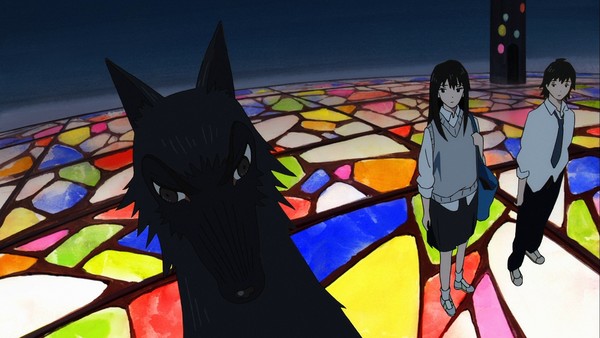
1. Sonny Boy
Sonny Boy was made to appease precisely nobody besides its creator Shingo Natsume, and as such, it felt like it was made specifically for me. As with Oddtaxi, I've already contributed a distressingly high number of words towards it, so I'm kinda at a loss for what to say here. How do you even describe Sonny Boy? It's a philosophical anthology that explores the fundamental questions of existence that have plagued humans for as long as we've been able to think, but that hardly gets at the heart of the series. It's also about the precise deployment of music cues written by bands hand-picked in part by Shinichiro Watanabe. It's about the exhilaration of science and the awe of religion. It's about monkeys playing baseball. But perhaps, more than anything else, Sonny Boy is about breaking rules, whether those rules are ordained by God, society, or the conventions of televised anime. Let it be a compass that points us in the direction of more buck-wild and creator-oriented series in the future.
Mercedez Clewis
5. Backflip!!
Ever since Fall 2016, I've been looking to fill the Yuri!! On Ice-shaped hole in my heart. Five years later, it remains one of my favorite sports anime, enough that I've still got a small shrine of goods—tenderly collected during my time as an English teacher in Japan—that mark this anime as a precious time in my life, prior to making something of a career out of writing about anime.
So I decided that maybe I'd find something new to hyper-fixate on. In Backflip!!, I found a series that was good enough to remind me of my adoration for Yuri!! On ICE and why ensemble casts of boys can be so darn charming. Truth be told, Backflip!! isn't breaking any new ground: in fact, what makes it so pleasant is that it leans into its tropes. That, plus all the bird imagery and the 2.5D-esque animation, makes for a heartfelt story that's less about winning and more about friendship and community.
Within a single cour, Backflip!! tells a tightly-paced story about tumbling, backflipping boys, and most importantly, boys who are allowed to be emotional and passionate. There are times when the storytelling blends into animation so breathtakingly beautiful that I cried earnest tears, which is my personal metric for all good anime. It's enough to make me yearn for the movie and hopefully a second season to come.
Hilariously, I remarked in a discussion with Caitlin Moore earlier this year while Backflip!! was still airing that it wouldn't be particularly memorable. But I'm gladly eating my words now, because Backflip!! turned out to be really, really good even if it will most likely only be remembered by fans who got really into it. Suffice to say Backflip!! made its mark on me: enough that two entire seasons later, I'm still thinking back to Spring 2021 and Gymnastics Anime.
4. Otherside Picnic
I've been a fan of Otherside Picnic since J-Novel Club started releasing the novels in 2019. It quickly became one of my favorite works out of Japan, combining my passion for SCP-esque media with creepypasta and yuri. Now, the latter might not be so apparent with the single cour presented here, but the former certainly is, lending itself to a creepy-crawly adventure jampacked with intrigue. I was hooked from start to finish.
In terms of production values, Otherside Picnic is admittedly fairly modest: the animation is just okay, with nothing spectacular to write home about. The show's soundtrack is pleasant enough: Takeshi Watanabe provides a suitably down-to-earth soundtrack that suffuses the setting with a sense of unease that's perfectly atmospheric, but largely unremarkable outside of a few key tracks where Watanabe plays with bpm and synths in interesting ways. Where the show shines is in its characterization and the otherworldly Otherside where leads Sorawo and Toriko romp around and encounter all manner of nightmarish creatures before coming home for dinner. It's a simple premise, but well-executed, and while you can easily compare the anime to the novel, I think it's better to treat the show as its own thing. Sit back, relax, and enjoy a trip to the Otherside! It's worth it, I promise.
3. The aquatope on White Sand
Community is something of a throughline for me this year. In a time where in-person community is hard to come by, seeing fictional characters bond and discover supportive communities allows me to live somewhat vicariously as I ponder the nature of our current, isolated existence.
aquatope is a curious case, largely because I wasn't sure what it was about until very late into the show. Its first half is something of a mess, full of complex, muddy emotionality and enough sapphism that I couldn't help but read the queerness into the text. And while that never came to fruition, what came in its place was a narrative about the importance of all forms of love, especially when its shared between people who are caretaking for one of the most important and vulnerable parts of planet Earth. It also set up things for a beautiful second half, which… wow, did aquatope snatch my wig y'all.
In its back half, aquatope becomes beautifully complex, picking up the slack from the first twelve episodes. With our two leads now as young, working adults, the series is much tighter, and makes the narrative of community all the more stronger with how it pushes and pulls Kukuru and Fuuka in dynamic directions. Is it perfect? No, but no series is. Instead, aquatope is a thoughtful centering of the experience of young women in a niche industry as they grow together, rather than apart. It leads to many a heartfelt, tear-induced moment: doubly so when the finale sticks the landing.
I suppose that's why I felt so much gratitude for the series: even in its weakest episodes, there's a lot of heart and care given to how it shapes the communities found within its aquariums. There's an intimacy to its characterization, and while a lot of my personal hopes for the characters never materialized, that doesn't stop the story's depiction of love on all levels from shining through. We still get to witness a thoughtful series that places women who support and push each other to be their best at the front and center of its narrative. squatope might drop the ball on occasion, but overall, it's one heck of a show that won't soon be forgotten, least of all by me.
2. Super Cub
Super Cub is a series that I didn't expect to glom onto as hard as I did. At base, it's a very simple slice of life series focused around cute girls doing things. In this case, the “thing” is riding motorbikes in the countryside city of Hokuto. And yet Super Cub became my personality and raison d'etre for an entire anime season as I witnessed Koguma, a girl swathed in loneliness and defined by a deep, familiar depressive state, find her way on the back of a Honda super cub bike.
What made this story so particularly effective for me was that it was an earnest look at mental illness: namely, at depression. Though the word is never used in the series, Koguma's depression is telegraphed so perfectly that it's impossible to ignore, and the show allows her to find a way through to more optimistic moments without negating or downplaying her pain. The moments when the desaturated color palette of the show gradually deepens with rich, full-bodied colors are some of the best in the series, a perfect visual code for how it feels to open your eyes and see the world a bit differently after a depressive episode, and it absolutely works.
That's not to say the show doesn't have hiccups: there are a few moments where the plot moves a bit too quickly, the inevitable dips in animation, and other minor nitpicks. But by and large, Super Cub remains one of the most powerful narratives of 2021 for me. It's a story about moving through trauma in a time of real, actual global trauma, which is a message I think many folks could benefit from as we look towards year three of the pandemic. It's a weighted blanket of a show: the digital equivalent of a thermos of hot chocolate. It'll be hard for me to forget a show like Super Cub. I'm sure that I'll be talking about it well into 2022 and beyond.
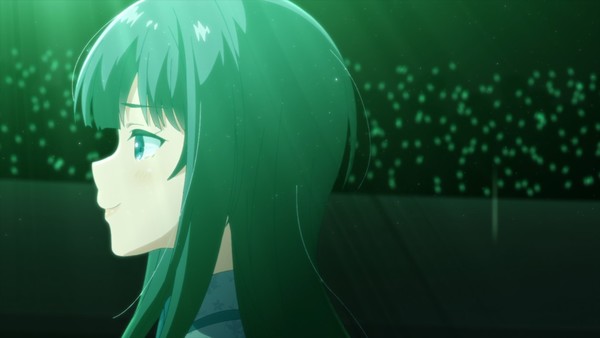
1. Idoly Pride
It might come as something of a surprise that Idoly Pride is my first place, seeing as I came to bat for Super Cub something fierce. But when it comes down to it, Idoly Pride still remains the anime that affected me the most, and has helped me weather the heartbreak and grief of the pandemic. It helps that the show is gorgeous from start to finish, meshing musicality, earnest storytelling, and a narrative about loss, grief, and legacy into a tight twelve episodes that had me hooked until the final second of the finale.
So much of that is thanks to how Idoly Pride upended the idol formula: it's certainly no Love Live!, being willing to look at the industry with a more critical eye. And honestly? Idoly Pride doesn't need to be a global, multimedia franchise. As it stands, it's cathartic, emotional, and wrung tears out of me on a weekly basis as three young women—well, two teens and a ghost—come to terms with their career as musicians, as people who don't want to be forgotten. It's more than I ever could have asked for, and has set a new personal bar for quality idol anime.
I've said it once, and I'll say it again: Idoly Pride is, by far, one of the best idol anime I've ever had the privilege of watching. Its messages still resonate with me daily. I routinely sing "Song for You" to my girlfriend. I still get teary over the finale. It's the kind of once-in-a-lifetime series that I'll always remember, even if I'm not always passionate about it. At the very least, it'll always be a bright spot in the pandemic, and a reminder that we can grow around grief, rather than being consumed by it.

The Best Moments of 2021
Nicholas Dupree
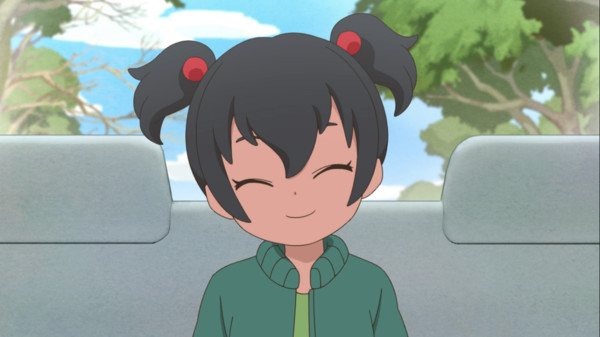
Oddtaxi was easily the sleeper hit of the year; a unique and charming creation made by people largely new to the anime industry that took influence not from other animation or blockbuster films, but the Coen Brothers' back catalog. Equal parts crime drama, sitcom, Animal Crossing, and magic trick, it utilized an airtight script to craft an incredibly complex Rube Goldberg machine of a plot that somehow managed to resolve its many characters' stories in ways that felt universally fitting. Some won, some lost, some barely broke even, and a couple of them literally got away with murder, but in the end it felt like we'd reached a satisfying conclusion for this strange cast of characters. It was, by and large, a rock solid conclusion that you'd always hope from an unproven original story.
Which makes it all the funnier when the last 15 seconds throws every bit of that ending into question. Without going into detail, the last shots of this show make for some of the most bright and cheery fridge horror I've seen in a good long while, and it's the perfect cap to a series that lived and breathed by that kind of tonal tension. From what I understand, supplemental materials reveal more of what happens right after this, but for my money this is the most perfect, most adroitly cruel place to end things, if just for how long and heavily I cackled afterwards. And that, more than anything, is what put this moment above anything else this year. The best part being that, in hindsight, every element was set up way back in the deceptively sedate first episode, and that's a perfect encapsulation of what made Oddtaxi such a treat to watch this year. There may have been bigger, crazier, or more surprising twists in others, but the final image of this one hits like a speeding taxi cab.
Richard Eisenbeis
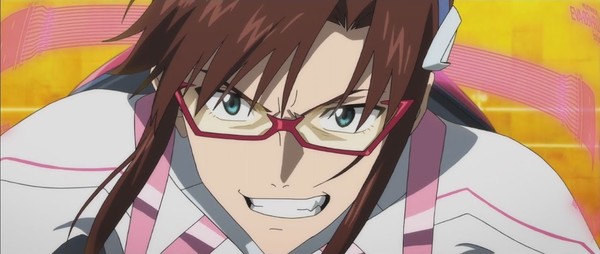
*Spoiler Warning: This entry is nothing but major spoilers for Evangelion: 3.0+1.0 Thrice Upon a Time
In the final moments of Thrice Upon a Time, Shinji sits alone on the beach from the End of Evangelion as a new world is created around him: a neon genesis without Evangelions. This is shown visually by the animation quality degrading before we are left with nothing but uncolored keyframes. Shinji has selflessly given all people on Earth a chance at a normal, fulfilling life. The price for this is that he is all alone. Yet at the last second, Mari appears as promised and, in a blink of an eye, the two awaken side-by-side in this new world. Only that Shinji is not the boy we have always known. He is in his twenties: The boy who never grew up over the course of three decades of Evangelion anime has finally grown up.
The two then reaffirm they still have their memories of the past world—and both know they are not alone. Mari then removes the bomb collar around Shinji's neck, freeing him of both his past and his responsibilities. Together, as the camera pans out, changing from anime to live-action, the two run off to explore this new world he has created: our world. In the final moments as we look across Japan—the very city where Evengelion's creator Hideaki Anno grew up—we hear these words from Utada Hikaru's One Last Kiss: “I love you more than you will ever know.”
It is the perfect ending to a franchise three decades in the making and legitimately brings me to the edge of tears just thinking about it. It is an utter rejection of the pessimism of the End of Evangelion. Instead of Shinji selfishly forcing Asuka to be his companion after ending the world, Mari chooses to be his companion after he creates a new one. The moral is no longer that the only thing worse than being close to others is being alone, it's that if you selflessly love those around you expecting nothing in return, you will find those willing to do the same for you. And that right there is a lesson to live by.
Rebecca Silverman

There are some things you can always count on in a Pretty Cure series, and one of those is that there used to be a “legendary Pretty Cure” who came before whatever set of magical girls currently bear the name. But why is it that almost no one ever remembers her? Episode thirty-seven of Tropical-Rouge PreCure has a particularly ominous reason that might explain why: because the mermaids who interacted with her once upon a time have been robbed of their memories. In fact, any mermaid who interacts with humans is going to have her memories taken away and put into a seashell to decorate the queen's wall, and that casts an entirely different light on Laura's friendships with the rest of the girls. That's because they've been so transformative for her; prior to meeting Manatsu, Laura didn't really have much of a goal beyond “become queen” and her personality reflected that. But through getting to know Manatsu, Asuka, Minori, and Sango, Laura has learned to be a good friend, to care about something bigger than herself, and even to stand up for what she believes is right. Discovering that all of that is going to be taken away from her once the job is done is devastating, and it throws away all of the work that she's done to become someone who's not just a rehash of The Little Mermaid. Just defeating the Witch of Delays won't be enough, this moment says. If Laura wants to remain the person she's become, she's going to have to change the world – and we can see from her reaction that that's far more frightening than firing off some magic attacks, especially in a Pretty Cure that has erred on the side of the light and fluffy.
Christopher Farris

Uma Musume is a promotional vehicle for Cygames's mobile game about raising anime-girl anthropomorphizations of famous racehorses. It is also a show that made me cry like a big, stupid baby multiple times throughout its second season. And of all those points, the one that stuck with me through the rest of 2021 was watching Twin Turbo – this tiny, razor-toothed seemingly-distant-relative of Sonic the Hedgehog – improbably cross the finish line first against a herd of supposedly-stronger opponents in the All Comers race. It's technically as ridiculously-constructed as anything else in Uma Musume framed around Turbo's teammates hijacking a broadcast to play over Tokai Teio's concert. But within that setup belies the amazing impression this moment is here for, as Teio's self-proclaimed rival roars in at the lowest point in her career, to communicate the purely inspiring thematic through-line of the whole season: Never give up. The absurd magic of the moment is made only more heartening with the knowledge that it actually happened – as like so many of the races depicted in Uma Musume, the All Comers is based on a real-world contest where Turbo's win was similarly unexpected. And there, as here, and as Uma Musume's second season consistently did, everyone's expectations were absolutely blown away.
Steve Jones

There was precisely one thing I wanted out of a second season of idol zombies, and that was an entire 20-minute block devoted to the one who likes to chew on people's hair. Not only did we get that, it also ended up being the best distillation of the show's quintessential goofiness. Tae's day out on the town unfolds with uproarious shagginess, tempered only by how much everyone in Saga seems to genuinely love her. Her particular set of quirks might not engender her to traditional idolhood, but for the assorted misfits drawn to Franchouchou's off-kilter brand, Tae's charms are plain as day. Whether it's buying groceries, having a dance battle with a chicken, or accruing enough gambling winnings to pay off their manager's exorbitant debt, Tae gets the job done. She's the idol for the people. The one and only. The legend.
MrAJCosplay
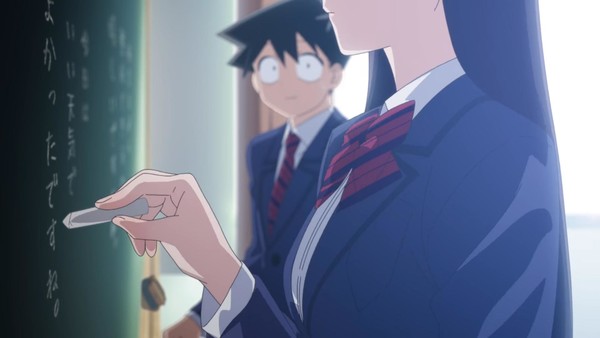
Komi Can't Communicate is a show that sometimes struggles with its identity. The show does such a good job at conveying characters with genuine social anxiety and communication disorders that I often get whiplash when the series dips into more exaggerated and oftentimes insulting tropes. However, despite the juggling act that the series struggles with throughout its first season, the closing scene from episode one remained as one of the most impactful moments of the year for me. Komi is a character who is heavily implied to have some kind of communication disorder and suffers from social anxiety to the point where it hinders her ability to make genuine connections with other people her age. She freezes up whenever she tries to speak with somebody, but because she's so conventionally attractive, many people just interpret her demeanor as that of the strong and beautiful silent type. However, beneath that stoicism is a girl crying out for help. It takes every bit of her strength just to write down about her past experiences and even then, something as heavy as baring herself to somebody in an unconventional way makes her feel like she's coming off as a burden. As the camera cuts to pieces of the chalk falling off the board, for a few moments it almost looks like tears are falling and she tries to run away by telling her classmate Tadano that he should just forget about everything. As she erases her entire life story on this chalkboard, you feel that suppression of self as if she's so used to struggling in vain; she can't do something that comes off as so easy for everybody else which somehow makes the journey feel so much harder.
But now that same chalkboard acts as a clean slate to start anew, and before she can even make it out of the classroom, Tadano simply writes down that the weather is nice. Komi walks back over and agrees on this same newly blank chalkboard and what follows is probably one of the longest conversations this poor girl has ever had with another individual. As the music continues to swell throughout this montage of cute little exchanges on this chalkboard, not a single word is said between either of them. They weren't talking about anything grand or philosophical, just simple mundane stuff, but the weight of every character written down can be felt throughout the scene. You really do get the sense that, for the first time in her life, Komi wasn't treated as a goddess nor was she being pitied. She was being treated as a friend that needed help and sometimes that's all it takes. Such a simple message that I feel like a lot of people take for granted, conveyed in such an equally simple yet powerful way.
Mercedez Clewis
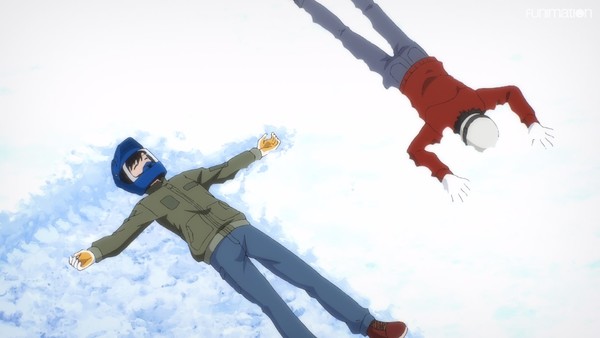
When I think about moments that have stayed with me all year, the first that immediately comes to mind is episode 10 of Super Cub: namely, Koguma and Reiko having a snowball fight. It's a simple scene: the girls wheel their cubs to a wide, open field covered in a perfectly thick layer of snow, surrounded by barren trees and mountains. The music—an upbeat instrumental version of the OP—picks up as the girls go riding around the snow with their cubs, jackets tossed to the wind before they turn to chucking snowballs at one another. It ends with them flopping down beneath a pale, yellow sun as they enjoy the brisk cold beneath their backs, remarking just how fun it is to live life along their motorbikes.
It's the kind of sweet moment that defines the slice of life genre for me: a moment where the main character gets to be a kid and better yet, gets to enjoy their own existence and just have a lot of fun. In Koguma's case, it's this beautiful moment where she gets to be both a kid and a teenager untethered by the intense loneliness that's previously permeated her world. Sweet, simple, and playful: that's the best way to sum up one of my favorite moments from this year.
James Beckett
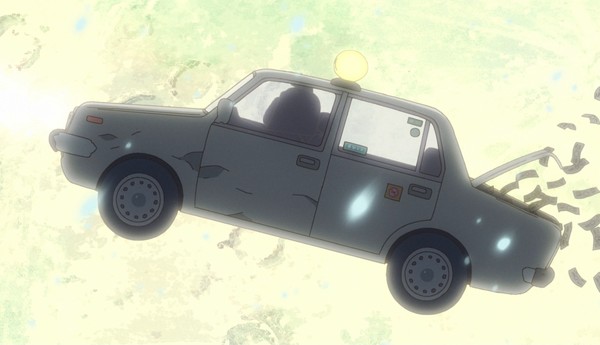
I'm a sucker for a tightly constructed plot, and one of the chief pleasures of watching anime in 2021 came from seeing all the pieces of ODDTAXI's puzzle come together in such a satisfying way as the series came to a close. Throughout twelve gripping episodes, we watched our mysterious protagonist drive his way through criminal conspiracies, murder mysteries, fraught romances, comically busted attempts at vigilante justice, and more. As all of the different animals' secrets and crimes come crashing into each other in ODDTAXI's climax, Odokawa himself drives his taxi straight off of a bridge and…well, if you haven't seen it yet, I wouldn't dare spoil anything else for you. Needless to say, what comes next was good enough to cement the show as a modern masterpiece, in my opinion. It just doesn't get any better.
Caitlin Moore
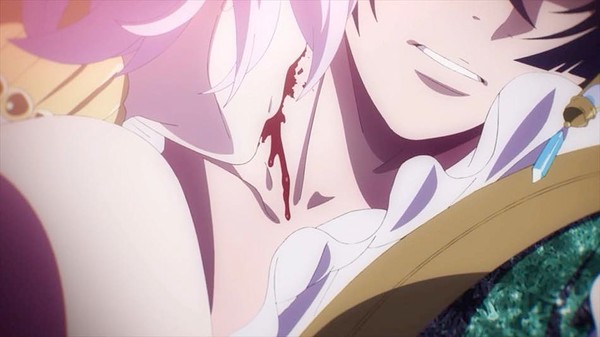
I went back and forth on whether to pick this or something classier, like Odokawa's climactic flight in Oddtaxi, but I've decided to live my truth and pick the one that has occupied more of my brainspace than any other single moment of the year since it aired: the sexy bloodsucking in episode 4 of The Case Study of Vanitas. Technically it's two moments – first Noe and Dominique and then Vanitas and Jeanne – but the general sentiment is the same for both: it was hot. Sorry for being horny on main, but I swear I have my reasons.
As someone who generally dislikes fan service, I get accused of hating sexy or adult anime. However, as the director Sayo Yamamoto once said in an interview, “When you look at conventional fan service, there's something that's so childish and simplistic, and they're all molded from pre-existing molds that come from prior fan service anime. What I know is if you can apply what you're really feeling, then you'll come up with something that's much more relatable and realistic in being sexy. So instead of retracing what's been around, if you actually experience these feelings, you can reflect something that's more realistic.” The Case Study of Vanitas exemplifies this philosophy, as the bloodsucking scenes reflect genuine sexual relationships more than any pantyshot or jiggling boobs ever could. Noe's expression and the inflection in his voice when he asks Domi to suck her blood, and her face and body language as he does so, and later, the way Vanitas' legs shake in ecstasy and he covers his mouth? Turns out I love sexy media. It just has to be, you know, actually sexy.
Lynzee Loveridge
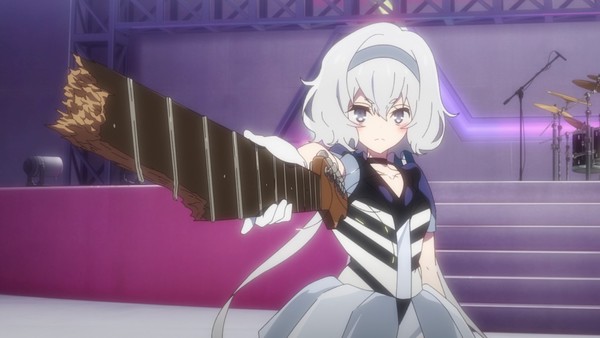
This entire moment was so raw that watching the video still gives me chills. The conflict between Junko and Ai leads up to this huge display of frustration as Junko sets out to prove herself. Ai, who was part of the very popular girl group Iron Frill when she was alive, is given the opportunity to rejoin (they don't know she's undead or that she's the same person) which causes Junko to become insecure. Until this point, Junko had a more demure, gentle personality but now that she sees she might lose her best friend, she comes out swinging. This all builds up to an intense performance (and her vocals are amazing) that I revisit again and again.
If you want to make sure your voice is heard, be sure to vote in our MEGA POLL! The poll closes on New Year's Eve, so don't miss your chance!
discuss this in the forum (131 posts) |
this article has been modified since it was originally posted; see change history
back to The Best Anime of 2021
Feature homepage / archives